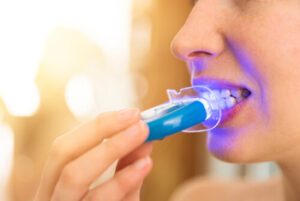A bright and white smile is highly coveted in today’s aesthetic-driven world. Teeth whitening treatments have surged in popularity, becoming a cornerstone of cosmetic dentistry. Whether you’re considering a professional teeth whitening treatment at a dental clinic or an at-home solution, how long do teeth whitening last?
This comprehensive guide explores the durability of various whitening methods, factors that affect longevity, and how to prolong your radiant smile.
What Is Teeth Whitening?
Teeth whitening is a famous cosmetic dentistry procedure designed to enhance the appearance of one’s smile by lightening the colour of the teeth and removing stains from the tooth surface. This treatment targets discoluorations caused by various factors, including dietary habits, smoking, and natural ageing.
The Role of Bleaching Agents
Types of Teeth Whitening Treatments
Teeth whitening treatments vary widely in terms of application methods, potency of the active ingredients, and the time required to see results.
Professional Teeth Whitening
Professional teeth whitening, also known as in-office whitening, is conducted in a dental clinic under the supervision of a dentist.
This method uses high-concentration bleaching gels that are much more potent than those available in over-the-counter products. The process involves applying a bleaching agent to the teeth, followed by activating the gel with a laser or LED light.
This light speeds up the chemical reactions that lighten the teeth, making this a quick method to achieve dramatic results.
A single session can significantly lighten teeth in about an hour, making it a popular choice for those seeking immediate improvements.
Key benefits:
- Fast and effective treatment with results often visible after one session.
- Safer application as performed by professionals, minimising risks to gums and enamel.
- Ability to target specific teeth or regions in the mouth.
At-Home Teeth Whitening Kits
At-home teeth whitening kits are convenient and cost-effective for achieving whiter teeth. These kits typically include whitening gels or strips that contain a lower concentration of peroxide than professional treatments.
The whitening agent is applied using trays, strips, or pens, and the treatment is done over several days or weeks, depending on the product’s specifications and desired results.
Key benefits:
- The convenience of conducting the whitening process in the comfort of your own home.
- More gradual whitening can be preferable for those with sensitive teeth.
- Lower cost compared to professional whitening.
Whitening Toothpaste and Mouthwashes
Whitening toothpastes and mouthwashes are formulated for daily use and contain mild abrasives and chemical agents that help remove surface stains from the teeth. While these products are less potent than other whitening treatments, they can be effective at maintaining the results of a previous whitening treatment or for minor stain removal.
Key benefits:
- Easy to incorporate into a daily oral hygiene routine.
- Gentle on teeth, making them suitable for long-term use.
- It helps to maintain the brightness of professionally whitened teeth.
Key limitations:
- Less dramatic results compared to professional or at-home whitening kits.
- It may take longer to see noticeable changes.
Choosing the Right Treatment
Choosing the right teeth whitening treatment involves considering various factors, such as the severity of your tooth stains, your budget, the speed at which you want to see results, and your overall dental health. For instance, if you need quick results for an upcoming event, professional teeth whitening might be the best option. Conversely, if you prefer a more gradual improvement in the colour of your teeth, at-home kits or whitening toothpaste better suit your needs.
It is pertinent to consult with a dental professional before starting any teeth whitening regimen, especially if you are worried about tooth sensitivity or the condition of your gums.
Professional Teeth Whitening
Professional treatments are generally more effective due to the stronger agents used. A dentist’s supervision also ensures the safety of the procedure, minimising risks such as gum burns and teeth sensitivity. The effects of professional treatment can last from one to three years, depending on your lifestyle and oral hygiene. Regular touch-ups and proper care can extend these results.
At-Home Teeth Whitening Solutions
At-home teeth whitening offers a practical and convenient way for individuals to enhance the brightness of their smiles outside of the dental clinic. Several types of products are available, each with unique features and application methods.
Here’s a closer look at some of the most popular at-home teeth whitening solutions and their effectiveness.
Whitening Strips and Gels
These slim and flexible strips are infused with a whitening gel with a lower concentration of hydrogen peroxide or carbamide peroxide. Designed to mould to the contours of your teeth, the strips ensure that the bleaching agent stays in consistent contact with the enamel, optimising the whitening effect. Depending on the product’s instructions, they are typically worn for 30 minutes to 2 hours and can be used over a few weeks.
Similar to the gels used in professional treatments but at a lower concentration, these can be applied using a small brush directly to the teeth or in conjunction with trays. Gels allow for precise application, effectively targeting specific areas that may be more stained.
Teeth Whitening Trays
These trays are typically provided by a dentist but can also be purchased over-the-counter where you mould them at home. The custom fit of the trays ensures that the whitening gel is evenly distributed across all teeth, minimising the risk of the gel leaking onto the gums and causing irritation. These trays are filled with whitening gel and are worn for a duration specified by the manufacturer or your dentist, often for several hours at a time or even overnight.
Duration of Effectiveness
While the convenience of at-home teeth whitening is appealing, it is important to have realistic expectations regarding the duration of the results. Typically, the effects of at-home whitening treatments can last from six months to one year. This duration is influenced by several factors, including:
At-home products have lower concentrations of bleaching agents compared to professional options, which translates to less dramatic results that fade more quickly.
Adherence to Instructions: How closely you follow the application instructions and treatment regimen can significantly impact the effectiveness and longevity of the results.
Lifestyle Choices: Habits like smoking or consuming foods and beverages that cause stains, can shorten the duration of the whitening effects.
Oral Hygiene: Regular brushing, flossing, and use of an antiseptic mouthwash can help maintain the results by removing plaque and preventing new stains from forming.
Enhancing and Maintaining Results
Factors Affecting the Longevity of Whitened Teeth
The longevity of teeth whitening results can differ greatly among individuals, influenced by a variety of factors from dietary choices to natural biological changes. By understanding these factors, you can maximise and maintain the results of your teeth whitening treatment. Below are some key factors that determine how long your teeth stay white after a whitening procedure.
Diet and Lifestyle
The impact of your diet on the longevity of your teeth whitening results cannot be overstated. Certain foods and beverages are known for staining teeth. These include:
- Coffee and Tea: Both contain tannins, organic substances that can adhere to the enamel and stain teeth.
- Red Wine: Similar to coffee and tea, red wine is high in chromogens and tannins, which are powerful staining agents.
- Coloured Beverages: Sodas, sports drinks, and fruit juices often contain artificial colours that can discolour teeth.
- Acidic Foods and Drinks: Items like citrus fruits and vinegar can erode enamel over time, making the teeth more susceptible to staining.
- Tobacco Products: Smoking can lead to significant teeth discolouration.
Minimising exposure to these substances or brushing your teeth soon after consuming them can help extend the whitening results.
Oral Hygiene Practices
Maintaining a diligent oral hygiene routine is essential for preserving the effects of teeth whitening. This includes:
- Brushing and Flossing: Brushing at least twice a day and flossing regularly are crucial for removing plaque and debris that can cause stains on your teeth. Additionally, incorporating whitening toothpaste into your routine can help gently polish your teeth and lift surface stains, further improving your dental hygiene.
- Regular Dental Check-ups: Regular dental visits every six months for professional cleaning are crucial. These cleanings can remove tartar that brushing and flossing alone cannot, helping to maintain your oral health. Additionally, these visits allow your dentist to monitor the condition of your teeth and gums, which can influence the overall appearance of your smile.
- Mouthwash: Incorporating an antiseptic or a whitening mouthwash can help reduce plaque and keep your teeth clean, contributing to longer-lasting whitening results.
Natural Ageing
As we age, several changes in the structure and appearance of our teeth can influence how long they stay white after whitening treatments:
- Enamel Thinning: The outer layer of the teeth, known as enamel, naturally wears down over time. Thinner enamel makes the underlying dentin more visible, which is darker and more yellow in colour. This can give the appearance of discoloured teeth even after whitening treatments.
- Translucency: Older teeth often become more translucent at the edges, making them appear less white, especially at the biting edges.
Individual Variations
Genetics also play a role in both the natural colour of your teeth and how they respond to whitening treatments. Some people may have naturally brighter enamel and thus experience longer-lasting whitening effects, while others may find their teeth prone to quick re-staining due to denser enamel that holds stains more aggressively.
By addressing these factors through lifestyle adjustments and diligent oral care, you can enjoy your whiter, brighter smile for as long as possible. However, it’s important to recognise that all whitening results will eventually fade, necessitating follow-up treatments or touch-ups depending on individual circumstances and the specific teeth whitening methods used.
Is Teeth Whitening Safe?
When conducted under the guidance of a professional or according to product instructions, teeth whitening is generally safe. However, overuse can lead to enamel damage and increased sensitivity. Using toothpaste designed for sensitive teeth and avoiding very hot or cold foods can help manage any discomfort post-whitening.
Frequently Asked Questions
For further clarity on maintaining your brighter smile or specific details about teeth whitening procedures, explore our Frequently Asked Questions section below.
Q: How often should I whiten my teeth?
A: It depends on the method used and your personal needs. Discuss with your dentist for a tailored plan.
Q: Can teeth whitening damage enamel?
A: If used excessively or improperly, yes. Always follow the recommended guidelines.
Q: Are there any alternatives to bleaching for whiter teeth?
A: Yes, dental veneers are an alternative cosmetic treatment that can provide a permanent whitening effect.
Conclusion
If you’re thinking about improving your smile, it might be the perfect time to talk to a professional about the best teeth whitening options for you. Remember, there’s no time like the present to brighten your smile and boost your confidence!
This guide aims to provide you with all the knowledge and tools you need to achieve and maintain a bright, white smile. If you have any questions or want to learn more about professional teeth whitening treatments, don’t hesitate to get in touch with us.
Why not take that next step towards a more radiant smile today?
Contact My HM Dentist at 02 9158 6379 to reclaim your pearly smile!
References:
https://www.healthline.com/health/how-does-teeth-whitening-work
https://www.listerine-me.com/teeth-whitening/whitening-treatments-products-work
https://www.colgate.com/en-in/oral-health/teeth-whitening/how-to-whitening-teeth-naturally
https://health.clevelandclinic.org/is-teeth-whitening-safe








